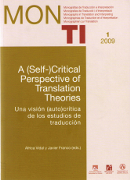Postcolonial studies and translation theory
##plugins.themes.bootstrap3.article.main##
Resum
La característica diferenciadora que poseen los enfoques postcoloniales en traducción radica en el hecho de que éstos analizan encuentros interculturales que se desarrollan en contextos marcados por desequilibrios en las relaciones de poder y es ahí donde se manifiestan tanto sus virtudes como sus defectos. Su mayor aportación ha sido sacar a la luz el papel del poder en la producción y recepción de traducciones. Sin embargo, se duda de que las teorías postcoloniales puedan aplicarse satisfactoriamente a otros intercambios interlingüísticos en los que las desigualdades en las relaciones de poder sean mínimas. Por otra parte, existe una tendencia generalizada a infravalorar las diferencias existentes entre los contextos (post)coloniales y se sugiere que las expresiones de resistencia propias de este movimiento, por lo general puramente textuales, dan muestra de que se ha prestado una atención insuficiente a las circunstancias sociopolíticas de la traducción. Asimismo se arguye que cabe la posibilidad de que determinadas perspectivas postcoloniales, al rechazar la apropiación reduccionista de otras culturas, hayan fomentado un cierto tipo de cosificación de la diferencia, que se refleja en una insistencia un tanto pesimista sobre el hecho de que es imposible ponerse en el lugar del Otro.
What distinguishes postcolonial approaches to translation is that they examine intercultural encounters in contexts marked by unequal power relations. Herein lie their strengths as well as their weaknesses. Their major contribution has been to illuminate the role of power in the production and reception of translation. But it is not certain that the postcolonial framework can be applied to other interlingual exchanges with minimal inequality of power relations. Moreover, there is a general tendency to underrate the differences among (post)colonial contexts themselves. It is suggested that insufficient attention to the socio-political background of translation has been reflected in postcolonial formulations of resistance, which are typically purely textual. It is argued also that some postcolonial perspectives, rejecting reductive appropriations of other cultures, may have been led to some sort of reification of difference, reflected in a rather pessimistic insistence on the inaccessibility of the position of the Other.
Descàrregues
##plugins.themes.bootstrap3.article.details##
La propietat intel·lectual dels articles pertany als autors i els drets d'edició i publicació, a la revista. Els articles publicats en la revista podran ser utilitzats lliurement per a propòsits educatius i científics, sempre que se'n faça una correcta citació. Qualsevol ús comercial és expressament penat per la llei.
Referències
Ahmad, Aijaz. (1994) In Theory: Classes, Nations, Literatures. New York: Verso.
Ahmad, Aijaz (1997) “Postcolonial Theory and the ‘Post-’ Condition.” Socialist Register 33. pp. 353-381.
Asad, Talal. (1996) “A Comment on Translation, Critique, and Subversion.” In: Dingwaney, Anuradha & Carol Maier (eds.) 1996. pp. 325-31.
Bassnett, Susan & Harish Trivedi (eds.) (1999) Post-colonial Translation: Theory and Practice. London: Routledge.
Bhabha, Homi K. (1994) “Of Mimicry and Man: The Ambivalence of Colonial Discourse.” In: Bhabha, Homi K. 1994. The Location of Culture. London: Routledge. pp. 85-91.
Bhabha, Homi K (1984) “Signs Taken for Wonders.” In: Barker, Francis et al. 1984. Europe and its Others: Proceedings of the Essex Conference on the Sociology of Literature. Vol. 1. Colchester: University of Essex. pp. 89-105.
Cheyfitz, Eric. (1991) The Poetics of Imperialism. New York: Oxford University Press.
Dingwaney, Anuradha & Carol Maier (eds.) (1996) Between Languages and Cultures: Translation and Cross-Cultural Texts. Pittsburgh: University of Pittsburgh Press.
Faiq, Said. (2001) “Subverted Representation in La Nuit Sacrée and its Arabic Translation.” International Journal of Francophone Studies 4:1. pp. 42-54.
Niranjana, Tejaswini. (1992) Siting Translation: History, Post-Structuralism, and the Colonial Context. Berkeley: University of California Press.
Parry, Benita. (2004) Postcolonial Studies: A Materialist Critique. London: Routledge.
Rafael, Vicente L. (1993) Contracting Colonialism: Translation and Christian Conversion in Tagalog Society under Early Spanish Rule. Durham: Duke University Press.
Robinson, Douglas. (1994) “Decolonizing Translation.” Translation and Literature 2. pp. 113-124.
Robinson, Douglas. (1997) Translation and Empire: Postcolonial Theories Explained. Manchester: St. Jerome.
Said, Edward. (1993) Culture and Imperialism. New York: Knopf.
Sengupta, Mahasweta. (1996) “Translation as Manipulation: The Power of Images and the Images of Power.” In: Dingwaney, Anuradha & Carol Maier (eds.) 1996. pp. 159-74
Simon, Sherry. (1999) “Translating and Interlingual Creation in the Contact Zone: Border Writing in Quebec.” In: Bassnett, Susan & Harish Trivedi (eds.) 1999. pp. 162-181.
Spivak, Gayatri. (2000) “The Politics of Translation.” In: Venuti, Lawrence (ed.) 2000. The Translation Studies Reader. London: Routledge. pp. 397-416.
Todorov, Tzvetan. (1986) “‘Race’, Writing, and Culture.” In: Gates, Henry Louis (ed.) 1986. “Race”, Writing, and Difference. Chicago: University of Chicago Press. pp. 370-380.
Tymoczko, Maria. (1999) Translation in a Postcolonial Context: Early Irish Literature in English Translation. Manchester: St. Jerome.


